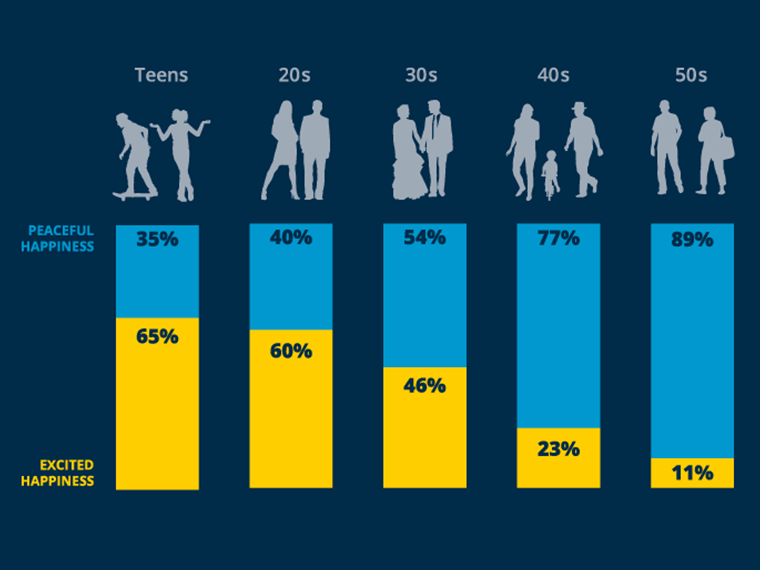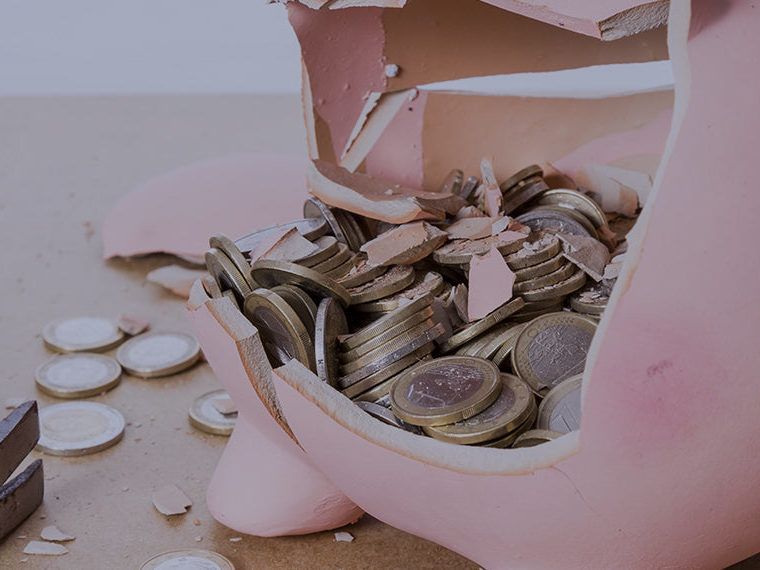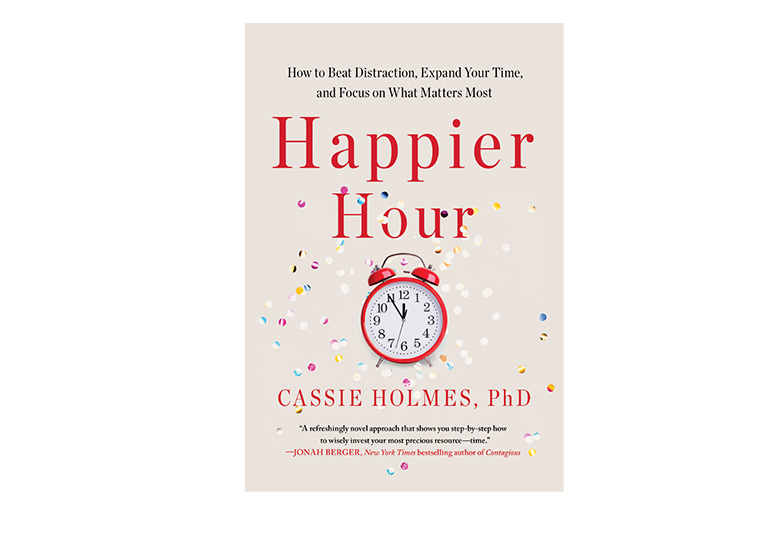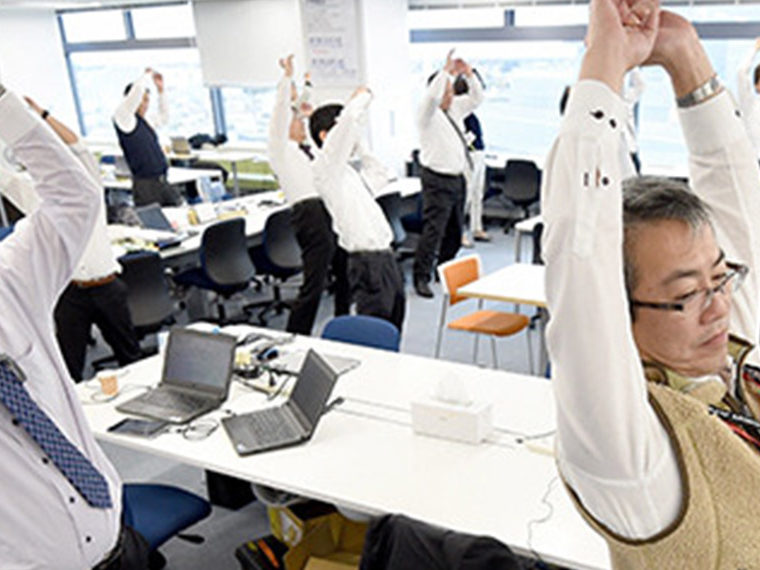New approaches to spending and time-management examine how our actions do or don't influence our level of satisfaction
It’s hard to miss the happiness industrial complex these days. Best-selling books-cum-movements such as Gretchen Rubin’s The Happiness Project and Marie Kondo’s “spark joy” decluttering manifesto variously encourage or scold millions about how to get to a happier place.
What gets less mass-market attention is a growing body of scientific research that gives an empirical foundation to the study of happiness. Prominent in this developing field is the study of spending choices and the extent to which we value time. And a common finding across the research is that we don’t seem to intuitively gravitate toward choices that increase our sense of happiness.
Two generalizations from nearly 20 years of study (and more on these below): time trumps money in creating happiness; and experiences trump possessions. Building on that foundation, researchers are now studying and quantifying behaviors throughout society to discover manifold relationships between our actions and our level of satisfaction with life.
Opt In to the Review Monthly Email Update.
Two Coffee Mugs
New research from the University of Toronto’s Cindy Chan and UCLA Anderson’s Cassie Mogilner Holmes, for instance, extends the study of experiences-versus-things to the effect of gift giving. In a small pilot experiment, participants reported that material gifts were clearly their default habit, with nearly 8 in 10 stating that the most recent gift they gave was material. Ahead of Mother’s Day and Father’s Day, study participants gifted either a material or experiential gift to a parent. In follow-up with the participants’ parents, those who received the experiential gift reported a greater strengthening in their relationship with a child than did parents who received a material gift.
In another experiment, Chan and Holmes focused on pairs of friends. The researchers initially recorded the pre-experiment connection between friends using four different measures. Gift givers were then randomly assigned the task of giving their friend either a material or experiential gift (value: $15). Recipients were given a heads up that a gift was on its way, and they were instructed to use/consume the experience within one week (without the friend). A week later the researchers asked the recipients to complete an online survey, with the added carrot of a $5 Amazon gift card for following through. Those who had received an experiential gift reported a greater relationship strengthening relative to the connection recorded at the front of the study.
Having sufficient money to meet one’s daily needs is paramount. But our proclivity for valuing money over time shortchanges our happiness.
Even creating an experiential frame around a material gift boosts relationship ties. Chan and Holmes had participants gift a coffee mug to a friend. The mugs were inscribed with one of two messages. “My Coffee Time” suggesting an experience, or the straight-up material message of “My Coffee Mug.” On a scale of 1 to 9, with nine being “more connected,” recipients of the “coffee time” mug said the gift scored 7.47, compared to 6.92 for participants who received the “coffee mug.”
In additional experiments, Chan and Holmes determined that “a driving factor underlying this effect is the greater level of emotion elicited when recipients consume experiences versus material goods.”
Experiential purchases — for oneself or others — also trigger more anticipatory excitement, which, it can be argued, is a kissing cousin to happiness. Researchers found that while waiting to receive a material good is indeed a positive experience, it is blanketed in a sense of impatience, while waiting to engage in an experiential purchase engenders more excitement.
Happy(er) Time
We’re also missing the boat on how we value time and money as potential drivers of happiness. UCLA Anderson’s Hal E. Hershfield and Holmes, along with Wharton’s Uri Barnea, asked thousands of Americans which resource they would want more of with the goal of giving their happiness a boost. Money was the clear choice for most participants. Yet in a series of experiments, the researchers found that, contrary to what study participants believed would please them more, “choosing more time was associated with greater happiness.”
Cassie Mogilner Holmes
And in a mash-up of money and time, 2017 research finds that spending money to buy ourselves more time does indeed boost happiness, yet less than one-third of the study’s participants report they actually spend money on time-saving purchases.
The study of happiness has an impact beyond personal self-care. Marketing initiatives can better connect with potential clients when messaging is built to appeal to happiness drivers. What’s more, the study of what can boost happiness dovetails with the growing focus on employee wellness programs. Far from a mere nicety, business is catching on that a less stressed (read: happier) workforce may be more engaged. And that likely delivers the holy grail of increased productivity.
An overview of scientific research on happiness
Spend on others. In a 2014 study, participants were given $5. Those instructed to spend it on something for themselves were less happy than the cohort instructed to spend $5 on someone else. And no, that’s not because consciously “pro-social” spending necessarily makes us happier than personal retail therapy. Earlier research found that two-year olds, ostensibly too young to know what the socially correct answer might be, also showed a predilection for deriving more happiness when giving to others.
Skip the fleece. Spending money on an experience tends to induce more happiness than buying another gadget or even a Ferrari, and gifting an experience can strengthen a relationship. For anyone out there in charge of the corporate holiday gift giving, a hint from the happiness academics: movie passes, restaurant gift certificates or a session at the local rock-climbing gym might resonate more than another branded fleece vest.
Read On
In 2016, Holmes and Michael I. Norton of the Harvard Business School authored a concise compendium of research titled “Time, money, and happiness,” published in a special issue of Current Opinion in Psychology on consumer behavior.
Be specific in your charitable giving. Fundraisers looking to make chronic givers of us all might want to keep in mind recent research that found donations made to a specific cause rather than a general fund of a broad-based charity trigger more happiness for the donor. And a happier donor might be more inclined to keep giving.
Value time. Having sufficient money to meet one’s daily needs is obviously paramount. But beyond that threshold, our proclivity for valuing money over time shortchanges our happiness. Hershfield, Holmes and Barnea asked more than 1,000 participants in an online survey if they wanted more time or more money. Nearly two thirds chose money. Yet when the researchers measured participants’ self-reported subjective well-being (the wonk terminology for happiness), the minority who chose time were happier. (Results held when controlling for available income and time. And in follow-up studies, participants were asked to focus on time or money, demonstrating a causal — and not merely correlational — relationship.) In a companion experiment that skewed to wealthier participants, a greater percentage chose time (55%) over money (45%). Once again, the time cohort reported a higher level of happiness. In a series of related experiments that roped in thousands of participants, the authors continued to see greater happiness when time was front and center: “Although time and money are both valuable resources that give hope for greater happiness, choosing time over money promises a happier life.”
Moderate Your Multitasking
The juggle that is life can nonetheless be tweaked to deliver a higher dose of happiness. Duke’s Jordan Etkin and UCLA Anderson’s Cassie Mogilner Holmes ran a series of eight tests to measure the conditions under which performing a variety of activities can add to or diminish happiness. Having a broad variety of activities to toggle between in the course of a day fueled more happiness than being stuck with less variety. But when the variety was jammed into one hour or less, not so much.
Make time to not think about money. In an experiment Holmes conducted that nabbed people as they entered a café, willing participants were asked to create a sentence from a preselected set of words. Some people got words that primed them to think about money. The other group were given words that evoked the concept of “time.” Upon entering the café, those who had been presented with the “time” prompts spent more time engaging socially with other customers, or on the phone (not working). The folks given the money prompt were more inclined to have their heads buried in work. When the participants left the café, they were asked to rate their happiness on a scale of 1-5. The socializing/time group rated their happiness at a median of 4.17. The money-primed group reported 3.53.
Give time. While not specifically focused on happiness, research by Holmes, Yale School of Management’s Zoë Chance and Michael I. Norton of Harvard Business School discovered a counterintuitive way to expand your sense of the amount of time you have: Give away some time. Spending time on oneself, or simply wasting time, or being handed a chunk of “free” time, was not as impactful as directing some time — as little as 10 minutes to a half hour — to someone else, or doing something for someone else. It’s not that the activity itself spurred any greater happiness, but it imbued a sense of accomplishment. “Giving time increases perceptions of having time – in both the present and the future – by increasing feelings of self-efficacy,” concluded the study’s authors. “Although feeling starved for time generally leads individuals to prioritize spare hours for themselves, our results suggest that if people instead spent time on others, they might feel less time constrained and better able to complete their myriad tasks and responsibilities.” And that would likely impact happiness.
Buy yourself more (free) time. As part of a series of experiments focused on how our spending can sway our sense of “time scarcity” (and thus, happiness), a team of researchers gave participants $40 on two consecutive weekends with instructions to spend $40 one weekend on any material purchase and the other $40 a different weekend on something that saved them time. The researchers then checked in with participants at the end of the day they made their purchases and registered their mood. The weekend the money was used to save some time, participants reported less time stress.
That said, wringing value from time-saving purchases is not dependent on having the deepest of pockets to tap. Across multiple experiments, spending to save time had its peak effect when median monthly spending was below $200.
Yet we’re not aggressively looking to outsource tasks that can buy us more free time. Across the eight experiments in this study, less than one-third of more than 4,000 participants reported making a time-saving purchase. Even among a subset of Dutch millionaires – arguably a group with plenty of discretionary income — 40% reported they did not purchase time-saving goods or services.
If you’ve been guilting yourself out of spending discretionary dollars on takeout (or Blue Apron for the cooks-who-have-no-time-to-cook), a housekeeper or outsourcing the laundry, you now have an empirical reason to reconsider: your happiness.
Featured Faculty
-
Cassie Mogilner Holmes
Professor of Marketing and Behavioral Decision Making; Donnalisa ’86 and Bill Barnum Endowed Term Chair in Management
-
Hal Hershfield
Professor of Marketing and Behavioral Decision Making
About the Research
Chan, C., & Mogilner Holmes, C. (2016). Experiential gifts foster stronger social relationships than material gifts. Journal of Consumer Research, 43(6), 913-931. doi: 10.1093/jcr/ucw067
Etkin, J., & Mogilner, C. (2016). Does variety among activities increase happiness? Journal of Consumer Research, 43. doi: 10.1093/jcr/ucw021
Hershfield, H.E., Mogilner C.,& Barnea, U. (2016). People who choose time over money are happier. Social Psychological and Personality Science, 7(7), 697-706. doi: 10.1177/1948550616649239
Mogilner, C. (2010). The pursuit of happiness: Time, money and social connection. Psychological Science, 21(9), 1348-1354. doi: 0.1177/0956797610380696
Mogilner, C., Chance, Z., & Norton M.I. (2012). Giving time gives you time. Psychological Science 23(10), 1233-1238. doi: 10.1177/0956797612442551





